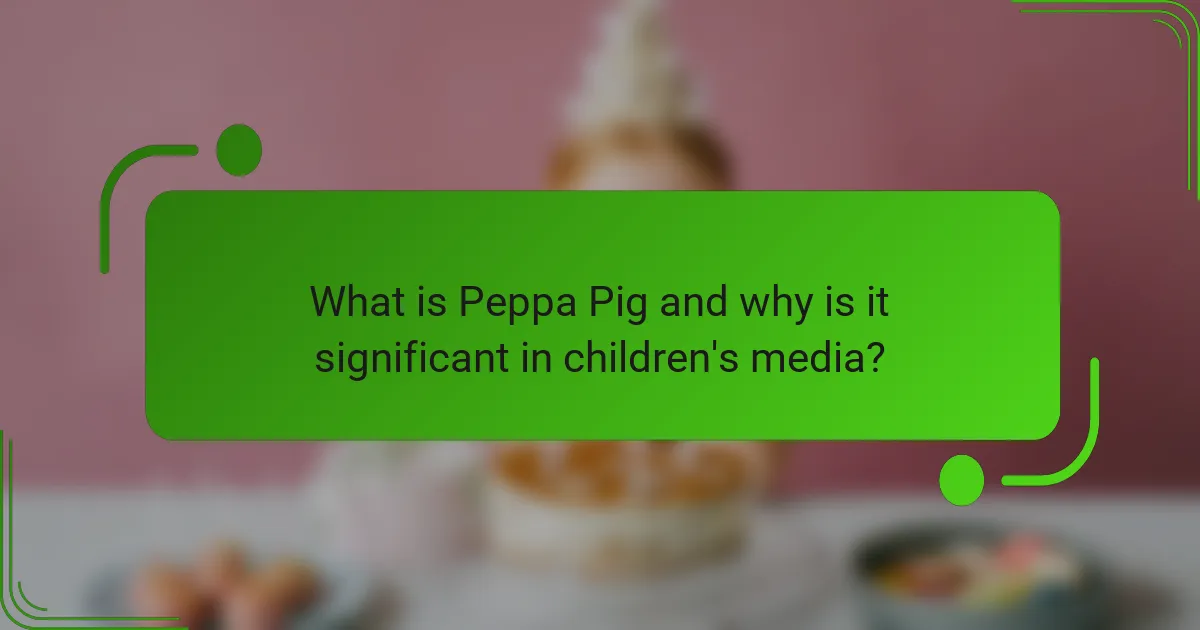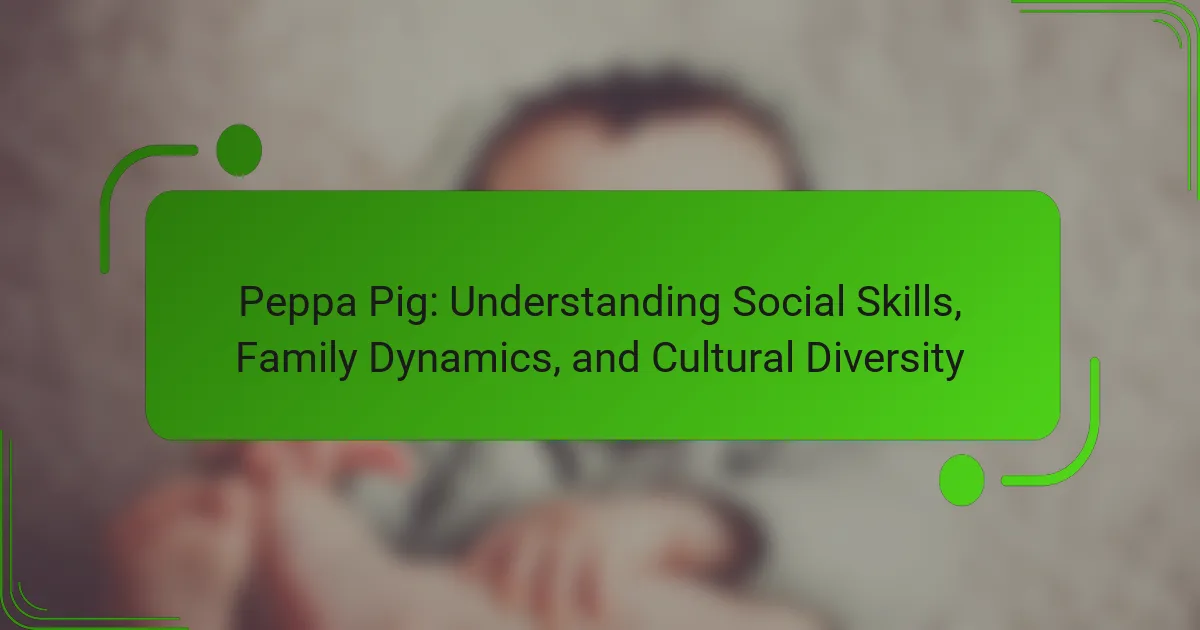Peppa Pig is a British animated television series designed for preschool children, featuring the titular character Peppa, her family, and their everyday adventures. The show is notable for its educational content, promoting social skills, family dynamics, and cultural diversity, making it significant in children’s media since its launch in 2004. With its simple animation style and humor, Peppa Pig appeals to both children and parents, leading to a global audience and numerous accolades, including BAFTA Children’s Awards. The series has also established a strong brand presence through its merchandise, further enhancing its cultural impact in children’s entertainment.

What is Peppa Pig and why is it significant in children’s media?
Peppa Pig is a British animated television series aimed at preschool children. The show features Peppa, a young pig, and her family engaging in everyday activities. It is significant in children’s media for its educational content and relatable themes. The series promotes social skills, family dynamics, and cultural diversity. It has garnered a global audience since its debut in 2004. Peppa Pig has won several awards, including BAFTA Children’s Awards. The show’s simple animation style and humor appeal to both children and parents. Its merchandise has also contributed to its cultural impact, making it a prominent brand in children’s entertainment.
How does Peppa Pig portray social skills among its characters?
Peppa Pig portrays social skills through interactions among its characters. The show emphasizes sharing, cooperation, and empathy. Characters often resolve conflicts through communication. They demonstrate kindness and respect in various scenarios. For example, Peppa and her friends often play together, showcasing teamwork. The series also highlights the importance of friendship and understanding differences. Characters learn from their mistakes, promoting personal growth. Overall, the show effectively teaches social skills in a relatable manner.
What specific social skills are demonstrated in Peppa Pig?
Peppa Pig demonstrates several specific social skills including sharing, empathy, and cooperation. Sharing is shown when Peppa and her friends take turns playing with toys. Empathy is highlighted in episodes where Peppa comforts friends who are sad or upset. Cooperation is evident when Peppa and her family work together on activities like building a snowman or preparing for a picnic. These interactions help children learn the importance of social interactions and relationships. The show effectively models these skills through relatable scenarios that children can understand and emulate.
How do these social skills impact young viewers?
Social skills depicted in “Peppa Pig” significantly impact young viewers by enhancing their interpersonal abilities. These skills include sharing, empathy, and cooperation. Young viewers learn to express emotions and understand others’ feelings. This understanding fosters positive interactions among peers. Research shows that early exposure to social skills improves children’s emotional intelligence. For instance, a study by Denham et al. (2012) found that children with strong social skills demonstrate better academic performance. Additionally, these skills contribute to conflict resolution in social settings. Overall, the portrayal of social skills in “Peppa Pig” cultivates essential life skills in young audiences.
What role does family dynamics play in Peppa Pig?
Family dynamics play a crucial role in Peppa Pig. The show illustrates various family interactions among Peppa, her parents, and her brother George. These interactions promote values such as love, cooperation, and problem-solving. Each episode often highlights family activities, reinforcing the importance of spending time together. The characters model healthy communication and conflict resolution. For example, when disagreements arise, they demonstrate negotiation and understanding. This portrayal helps children learn about family roles and relationships. Overall, Peppa Pig effectively uses family dynamics to teach social skills and emotional intelligence.
How are family relationships depicted in the show?
Family relationships in “Peppa Pig” are depicted as loving and supportive. The show highlights the bond between Peppa and her family members. Peppa frequently interacts with her parents, George, and her friends. The characters often engage in family activities, promoting togetherness. Episodes showcase problem-solving and cooperation within the family. The portrayal emphasizes communication and understanding among family members. The show reinforces the importance of family in children’s lives. Overall, the depiction is positive and nurturing, aligning with developmental themes for young audiences.
What lessons about family can children learn from Peppa Pig?
Children can learn important lessons about family from Peppa Pig. The show emphasizes the value of family relationships. Characters demonstrate love and support for one another. Episodes often showcase family activities, like playing games or going on outings together. The interactions highlight communication and cooperation among family members. Children see how family members resolve conflicts and express feelings. This teaches them empathy and understanding. Peppa Pig also portrays diverse family structures, promoting acceptance and inclusivity. Overall, the series provides a positive view of family dynamics.
How does Peppa Pig address cultural diversity?
Peppa Pig addresses cultural diversity by featuring characters from various backgrounds. The show includes friends from different nationalities, such as the French character, Madame Gazelle. Each character introduces cultural elements through language, food, and traditions. Episodes highlight celebrations like Chinese New Year and Christmas. These representations promote understanding and acceptance among young viewers. The diversity in the show reflects real-world multiculturalism. By showcasing different cultures, Peppa Pig fosters inclusivity and respect. This approach helps children learn about and appreciate differences.
What examples of cultural diversity are presented in the series?
The series “Peppa Pig” presents several examples of cultural diversity. Different animal characters represent various cultures and lifestyles. For instance, the Chinese family celebrates the Lunar New Year. This episode introduces traditional customs and food associated with the celebration. Additionally, the series features characters from diverse backgrounds, such as the French pig who enjoys croissants. These portrayals promote understanding and appreciation of different cultures. The inclusion of various languages and traditions in the episodes highlights the importance of cultural awareness. Overall, “Peppa Pig” effectively showcases cultural diversity through its characters and storylines.
How can Peppa Pig foster understanding of different cultures among children?
Peppa Pig can foster understanding of different cultures among children by introducing diverse characters and settings. The show features friends from various backgrounds, such as Pedro Pony and Suzy Sheep, who represent different cultures. Each episode often highlights unique cultural practices and traditions. For example, episodes may showcase festivals, foods, or customs from different countries. This exposure helps children learn about and appreciate diversity. Additionally, Peppa Pig’s engaging storytelling makes cultural education entertaining. The relatable scenarios encourage discussions about differences and similarities among cultures. By presenting these themes, Peppa Pig promotes inclusivity and understanding among young viewers.
How do social skills, family dynamics, and cultural diversity interconnect in Peppa Pig?
Social skills, family dynamics, and cultural diversity interconnect in Peppa Pig through relatable storytelling and character interactions. The show portrays social skills by demonstrating sharing, teamwork, and empathy among characters. Family dynamics are illustrated through the interactions of Peppa with her family, showcasing support and communication. Cultural diversity is represented by the inclusion of various animal families with distinct traits and backgrounds. This diversity promotes understanding and acceptance among young viewers. The show’s characters frequently engage in activities that highlight cooperation and respect for differences. Overall, Peppa Pig effectively weaves these elements together to teach valuable life lessons.
What are some key takeaways from Peppa Pig for parents and educators?
Peppa Pig teaches valuable social skills and family dynamics for children. The show emphasizes sharing, cooperation, and empathy among characters. Each episode often illustrates problem-solving in relatable situations. Parents can use these lessons to spark discussions with their children. Educators can incorporate themes from the show into classroom activities. The diverse cast promotes cultural awareness and acceptance. Research indicates that children’s programming like Peppa Pig can enhance social development. Engaging with the content can foster positive family interactions and learning experiences.
How can parents use Peppa Pig to teach social skills?
Parents can use Peppa Pig to teach social skills by discussing the interactions between characters. The show presents various social situations, such as sharing, cooperation, and conflict resolution. Parents can pause episodes to ask children how they would feel in similar situations. This encourages empathy and understanding of others’ emotions. Additionally, parents can model behavior by reflecting on the characters’ actions. Engaging children in role-play based on Peppa Pig scenarios can further reinforce these skills. Research shows that children learn effectively through storytelling and relatable characters. Peppa Pig serves as a valuable tool for initiating conversations about social behavior.
What activities can educators implement based on themes from Peppa Pig?
Educators can implement various activities based on themes from Peppa Pig. Activities can include role-playing family dynamics, where children enact scenarios from the show. This encourages understanding of relationships and communication.
Art projects can involve drawing favorite characters and discussing their traits. This fosters creativity and reinforces character recognition.
Storytime sessions can focus on episodes that teach social skills. Educators can facilitate discussions on the lessons learned from each story.
Outdoor activities can include games inspired by Peppa’s adventures, promoting physical activity and teamwork.
Cooking sessions can involve making simple recipes featured in the show, enhancing cultural diversity awareness.
These activities align with the educational goals of teaching social skills, family dynamics, and cultural understanding.
Peppa Pig is a British animated television series designed for preschool children, notable for its educational content and relatable themes. The show emphasizes social skills, family dynamics, and cultural diversity through the interactions of Peppa and her family, teaching values such as sharing, empathy, and cooperation. It also features characters from various backgrounds, promoting understanding and acceptance of different cultures. The series has garnered a global audience since its debut in 2004 and serves as a valuable resource for parents and educators to foster social development in children.
